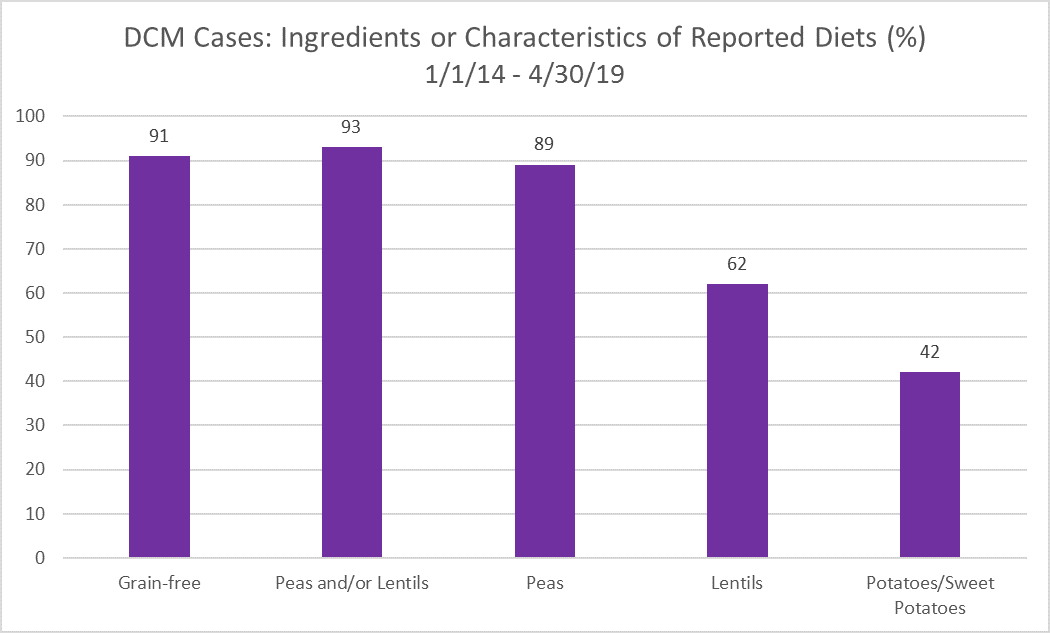The FDA Report on Dilated Cardiomyopathy and Grain-Free Diets in Dogs
With all of the talk in the news about the FDA’s report on the potential link between certain diets and canine heart disease, it seems pet owners are more confused than ever about a subject that was already confusing to begin with. There is so much information and misinformation, its hard to make sense of it all. Here are some answers to a few of the common questions about this report concerning DCM.
1. What exactly is the FDA report about?
The media headlines that state the FDA reports a possible dietary link to canine heart disease are slightly misleading. The potential link is between a particular diet and one type of heart disease: Canine Dilated Cardiomyopathy (DCM). DCM is a form of heart disease in which the heart muscle becomes weak and the heart becomes enlarged. This causes the heart to lose the ability to pump blood to the rest of the body. If not treated, DCM will cause complete heart failure. The most common symptoms include loss of appetite, pale gums, increased heart rate, coughing, difficulty breathing, periods of weakness, and fainting. There are other causes of DCM including genetic predisposition and deficiency of the amino acid taurine.
2. What type of diet is the FDA investigating?
The link between DCM and diet refers to certain pet foods labeled as grain-free and other diets (such as boutique or exotic diets) which contain a high proportion of peas, lentils, and other legume seeds, and/or various forms of potatoes (whole, flour, protein, etc.) as main ingredients. Many of the cases reported to the FDA include breeds of dogs not previously know to have a genetic predisposition to DCM. But reported cases also include dogs not on grain-free diets (see chart below). The apparent link between grain-free diets and DCM may be due to ingredients used to replace grains such as lentils or chickpeas, but also may be due to other common ingredients commonly found in boutique, exotic, or grain-free (BEG) diets, such as exotic meats, vegetables, and fruits.
3. How many cases of DCM in dogs have been reported?
Between January 1, 2014 and April 30, 2019 the FDA received reports of DCM affecting 560 dogs, 119 of which resulted in death. The bulk of these reports occurred between December 1, 2018 and April 30, 2019. It is important to note that there is an estimated 77 million dogs in the U.S., and the number of cases reported to the FDA represents 000727% of the total canine population.
4. What brands of pet food have been associated with DCM?
The FDA has identified 16 popular food brands that may have a potential link to DCM. The brands with the most reported cases include Acana and Zignature brands, and those with the least include Nutro and Rachael Ray Nurish (see below).
5. What do we know?
What we know is that we don’t know. The FDA is currently seeking more reports from the veterinary medical community and states they are using a variety of scientific methods to understand the seemingly high correlation of DCM and grain free diets. Right now there is not enough data to determine anything conclusively.
Pet food marketing has outpaced the science, and owners are not always making healthy, science-based decisions even though they want to do the best for their pets. The recent cases of possible diet-associated DCM are obviously concerning and warrant vigilance within the veterinary and research communities. Importantly, although there appears to be an association between DCM and feeding BEG, vegetarian, vegan, or home-prepared diets in dogs, a cause-and-effect relationship has not been proven, and other factors may be equally or more important. [Journal of the American Veterinary Medical Association, December 2018]
For the vast majority of dogs, we do not yet know what is causing this disease. There are definitely some dogs with DCM that have low taurine levels, many of which will improve with taurine supplementation and change of diet. For dogs that have normal taurine levels, however, other nutritional deficiencies may be present. Some nutritional deficiencies can affect the heart’s normal function, so an insufficient amount of these nutrients (or reduced bioavailability) in the diet could cause heart disease. Diet-associated DCM could also be due to an ingredient in the food that is toxic to the heart.
There appears to be 3 separate groups of dogs with DCM:
- Diet-associated DCM with normal taurine levels: this occurring in dogs on Boutique, Exotic, or Grain-Free (BEG)
- Primary DCM in predisposed breeds that is unrelated to diet: the traditional, genetically-related DCM in typical breeds such as Dobermans, Boxers, Irish Wolfhounds & Great Danes.
- Diet-associated DCM with taurine deficiency: the least common form of DCM and it appears to happen in both breeds predisposed to DCM and those that are not.
6. What should I do now?
First, don’t panic. We encourage all pet owners seek nutritional guidance about their specific pet from either their veterinarian or a board-certified veterinary nutritionist [ACVN.org]. A veterinary nutritionist can help you determine what feeding options are best for keeping your pet healthy, prevent disease, and/or manage an existing illness.
If your dog is currently on a BEG diet, it is unlikely that he/she will develop DCM, but because there are so many unknowns and the fact that there is absolutely no health benefit of grain-free or exotic diets except in the very rare case of food allergy, you should consider switching to a non-BEG diet. Again your veterinarian or a veterinary nutritionist can help you make the best choice.



